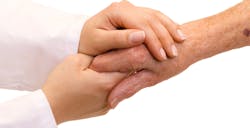Holocaust survivors, their children, and “epigenetic inheritance”
Elie Wiesel, the author and human-rights activist, was 15 years old when, in 1944, the occupying Nazis loaded him, his family, and all the Jews of his hometown of Sighet, Hungary, onto cattle cars and shipped them to the infamous Auschwitz concentration camp. When he arrived, this is what he saw, as described in his autobiographical work Night:
“Not far from us, flames were leaping up from a ditch, gigantic flames. They were burning something. A lorry drew up at the pit and delivered its load—little children. Babies! Yes, I saw it—saw it with my own eyes….those children in the flames.”
Might they have caused genetic changes as well—changes that he and other Holocaust survivors have passed on to their children? That possibility has been raised by provocative new research.
Rachel Yehudi, PhD, and her research team at New York’s Mount Sinai Hospital undertook a genetic study of 32 Jewish women and men who were victims of the Holocaust. Some were imprisoned in Nazi concentration camps; some experienced or witnessed acts of torture; some survived World War II in hiding. Yehudi’s team also analyzed the genes of their children, who are known to have an increased risk of stress disorders. The results were compared to those of Jewish families who lived outside of Europe during World War II, and thus had no direct experience of the Holocaust.
The researchers found genetic changes in the children of the Holocaust survivors that they did not find in the control group. Specifically, they analyzed one region of a gene that has been associated with the regulation of stress hormones. They found chemical “tags” on the same part of this gene in the Holocaust survivors and their children, but not in either generation of the controls. These tags attach themselves to portions of the DNA, functioning to switch genes on and off.
To Yehudi, this is powerful evidence for “epigenetic inheritance”—the theory that environmental influences can affect genes and be passed on to the next generation. “If there’s a transmitted effect of trauma, it would be in a stress-related gene that shapes the way we cope with our environment,” she says. “The gene changes in the children could only be attributed to Holocaust exposure in the parents.”
Textbook genetics holds that genes contained in DNA are the only means for the transfer of biological information from generation to generation. And yet, as the biology of genetic tags comes to be better understood, we may come to see that the environment the parent experiences can impact the children’s genetic makeup and health. It may be that not only the effects of extreme emotional trauma like that experienced by victims of atrocities, but other enormous stresses, physical and psychological, can be passed on.
I wonder how the genes of people who survived the attacks of September 11, 2001, might have been affected? Or people who survived Hurricane Katrina—but saw neighbors washed away by the floodwaters? Or people who endure lives of greater-than-normal physical pain—chronic sufferers from disabling migraines, for example? I wonder what we may learn from genetic analyses of such people and their offspring. If distress is passed from generation to generation, maybe science can find a way to interrupt or reverse the process.


